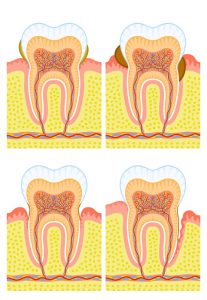Gum Treatment (Periodontics)
Gum disease is one of the two most common diseases that affect our oral cavity. This disease affects the gum and bone surrounding the teeth. The disease does not produce obvious signs and symptoms until it has progressed to an advanced stage. In all stages of gum disease, patients usually suffer from bleeding gums as a result of bacteria causing damage to the gums.
Gum specialists (Periodontists) are specially trained dentists who detect and treat the complete range of gum diseases.
FAQs on Gum Treatment
In order to understand gum disease, we need to first understand the structure surrounding the tooth. The tooth is divided into the crown and the root. The root is surrounded by bone, which in turn is covered by gums. There is a space between the tooth and gums, called a pocket, which is present both in healthy and diseased states.
Gum disease originates from bacteria that gain entry into the pocket. When bacteria enter, they attack the gums. This causes injury to the gums, resulting in spontaneous bleeding upon touch, pain, redness, and sometimes swelling.
If bacteria hardens to form tartar, it can spread deeper towards the bone and cause the destruction of the bone and as well as the deepening of the periodontal pocket.
In the advanced stage of gum disease (periodontitis), the tooth would have so much bone lost that it becomes shaky and may drift out of position. During the later stages of gum disease, the tooth can no longer be kept and has to be extracted.
The accumulated bacteria in the infected gums can enter our blood stream to be transported to the various organs; such as the heart, kidneys, and womb; in the body. The maintenance of good oral health is paramount in controlling a series of health problems that will occur with gum disease, but having said that, it becomes a vicious cycle as it is also established by the World Health Organisation (WHO) that patients afflicted with conditions such as diabetes are prone to the worsening of gum disease.
- Gum treatment that is left untreated will lead to following:
- Gum recession
- Shaky teeth
- Bad breath
- Bleeding gums
- Spacing between teeth
- Shifting of teeth
- The final stages of gum disease presents with pain and tooth loss.
- After gum disease has been successfully treated, the periodontist will perform follow-up care to ensure that gum disease will not reoccur.
- Professional cleaning and careful monitoring will be done during follow-ups.
- Follow-up appointments for proper check and clean are important as a lack of it will lead to the recurrence of gum disease.
- Bacterial infections, causes gums to bleed easily from the pockets. Bacteria can also gain entry into the blood stream through the pockets present. This can gives rise to the effects on other parts of the body which affects general health. It is uncommon knowledge that patients with advanced gum disease actually have a large surface area of infection and inflammation. In fact, research has shown that the surface area over which bacteria can enter the blood stream is equivalent to the total surface area represented by two hands.
- Bacteria affects the blood stream in two ways. They can either enter the blood stream directly, or they can send chemicals into the blood stream. These harmful substances can then be transported to the various organs in the body. It is also well established by the World Health Organization (WHO) that diabetes can lead to the worsening of gum disease.
- Mothers-to-be often suffer from severe gum bleeding and even dramatic gum swellings. This is due to the increase in estrogen and progesterone levels during pregnancy. These changes in hormonal levels can lead to gum disease.
- When a pregnant mother has gum disease, the gum are weaker and tend to bleed. This causes bacteria from the oral cavity can enter the blood stream. . These bacteria will travel in the blood stream and enter the placentain in great numbers to reach the foetus. Such an infection of the placenta can lead to pre-term, low birth weight babies. If a pregnant mother has an untreated gum disease, she is exposed to 7 times more risk of catching the infection when compared to a pregnant mother who is treated for gum disease. When a baby is born pre-matured, at a low birth weight, the baby is more prone to medical problems such as breathing problems, heart problems, learning difficulties and many other health issues.
- Research has shown that gum treatment by gum specialists can reduce the risk of pre-term low birth weight babies. One research report done in University of North Carolina, USA, had shown that mothers-to-be who had their gum disease treated had the same low risk for pre-term low birth weight babies when compared to mothers-to-be who had healthy gums.
- It is therefore imperative to have gum disease treated early during the pregnancy. It is advisable to have treatment done during the second trimester too. In fact, it is recommended to have a gum check by a specialist before trying for a baby to avoid the problems mentioned, as prevention is better than cure. The practice of good oral hygiene practice is also important to minimize the amount of bacteria residing in the mouth. Flossing at least once a day and brushing twice a day will go a long way in preventing gum disease and cavities.
- As gum treatment is a specialised treatment, your periodontist dentist should possess relevant post graduate qualifications. A full-fledged periodontist would have to undergo 3-years of full-time training, continuous education in the form of regular attendance of lectures and hands-on course are important for constant upgrading skills and knowledge.
- It is also important to see before and after photos of work performed by the periodontist. This is because, before and after photos of work performed will provide an idea of the possible final outcome. These photos can also be used to gauge the periodontist’s experience in the specific clinical situation.
I Want To Make An Enquiry/Appointment
Make An Enquiry/Appointment
Fill up the form with your particulars if you would like to learn more about our services.
I hereby give my consent to T32 Dental to send emails, SMS message, and/or call to my contact particulars provided herein

